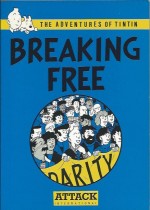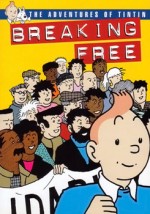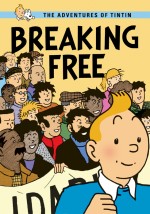


By J. Daniels (Attack International/Freedom Press)
ISBN: 0-9514261-0-9; 978-0-9514261-0-4; 978-1-90449-117-0 (Freedom Press)
“Freedom of the Press is only guaranteed to those who own one†– Abbott Joseph Liebling.
Politics is always composed of and used by firebrands and coldly calculating grandees, but that’s the only guiding maxim you should trust. Most ordinary people don’t give a toss until it affects them in the pocket or it’s their families under judicial scrutiny. No matter to what end of the political spectrum one pledges allegiance, the greatest enemy of the impassioned ideologue is apathy. This forces activists and visionaries to ever-more devious and imaginative stunts and tactics…
Crafted by the enigmatically anonymous J. Daniels, concocted and released by the anarchist faction Attack Internationalin 1988, The Adventures of Tintin – Breaking Free is a perfect exercise in the use of Détournement (“turning expressions of the capitalist system and its media culture against itselfâ€), utilising mimicry, mockery, parody and satire to counter the seductive subversion of the Monied Interests policing the status quo.
It also reads rather particularly well – even today – as social documentary and human drama, for all its earnest worthiness and fiercely dogmatic posturing…
The gimmick is this: the comforting cosy style and iconic images of Hergé’s immortal adventurers are transferred into our pedestrian oppressive, corrupt world and co-opted to incite a revolution in thinking and action…
In Chapter 1, ‘We’ve Had Enough!’ sees unemployed hothead, disenfranchised youthful dole-queue outcast and petty thief Tintin visit his uncle on the run-down-and-dying council estate (remember those?) where the once-vital, fulfilled salt-of-the Earth good bloke and his wife Mary now strive on the breadline. The lad needs cash, so The Captain suggests a labouring job beside him on the new building site.
It’s not an easy option: although there’s work to be had, tensions are high on site: dangerous working conditions, shoddy management practices and subsistence wages for the desperate men crafting luxury flats for more of the rich and gentrified types steadily pushing real people out of the community…
Another alienated faction joins the swell of discontent as squatters break in to the flat next door and the Captain helps them sort out the utilities and other necessities. Everybody knows the council is letting the estate die of neglect so that corrupt councillors can sell it off, so these lesbian activists are welcomed as fellow fighters against the powers that be.
Tensions mount as the National Front (and whatever happened to them, hmm?) recruit in broad daylight, skinheads carry out racist attacks and trendy wine bars push out good old-fashioned workingmen’s pubs. Soon Tintin is striking back whenever he can: vandalising posh cars and pickpocketing rich poseurs. Of course, all proper men need are jobs, beer, football and a decent life, but the boy soon has his eyes opened – if not his opinions changed – when he is made painfully aware of how even those lower-class paragons treat their own women…
Events come to a head when a worker dies on the building site and the supervisor is clearly more concerned about lost time. He even suggests poor Joe Hill was drunk and not the victim of negligent, non-existent safety procedures…
‘One Out, All Out!’ finds a wildcat strike seeking compensation for Joe’s widow escalating into a national furore after trade union officials strike a shady deal with the calculating property developers forcing the incensed workers to reject their useless official action in favour of measures that will actually work.
Soon bosses and unions are conspiring together to break the unsanctioned, unofficial action as ordinary people of the community rally around the strikers, providing food, money and – most important of all – encouragement.
The authorities quickly resort to their tried and true dirty tricks: picket-breaking riot squads, undercover agent provocateurs, intelligence-led targeted arrests of “ringleaders†and brutal intimidation.
Scab labour is harshly dealt with in ‘Let’s Get Organised’, as the hard-working, underappreciated women increasingly take up the challenge. The movement is growing in strength and national support. Soon other cities are in revolt too, with The Captain an unwilling and unlikely figurehead. Tintin, ever impatient, finds like-minded hotheads and secretly begins a campaign of literally explosive sabotage…
It all culminates in ‘Getting Serious’ as events kick into overdrive after the Captain endures a punishment beating from unidentified thugs and his family are similarly threatened. Scared but undeterred, the old salt carries on planning for a national march. With reports coming in of similar movements in Poland, Yugoslavia and other Warsaw Pact countries (the Soviet Empire was still very much in existence back then and continually crushing workers’ freedoms: at least nowadays Russia never interferes in the social or political affairs of other nations…), local groundswell becomes a national expression of solidarity and the underclass consolidates under a mass rallying call to arms…
When the riot squads are again deployed, it all turns ugly on a global scale, but in the aftermath The Captain has been “disappeared†or, as the authorities would have it, been “arrested for conspiracyâ€.
With half a million people on the streets of the city, the powers-that-be move to full military response, but it’s too late…
The later edition, published by Freedom Press in 2011, also includes the infamous early adventures of this extremely alternative Tintin (as first seen in polemical pamphlet The Scum in 1986) from the scallywag’s days sorting out Rupert Murdoch from the picket line at Wapping, during the infamous and now-legendary Printer’s Strike…
Passionate and fiercely idealistic, the initial release of Breaking Free unsurprisingly unleashed a storm of howling protest from the establishment, Tory Press and tabloid papers (especially News International) and by all accounts even Prime Minister Thatcher was “utterly revoltedâ€.
That only meant the little guys had won: achieving a degree of publicity and notoriety such puny, powerless underdogs could only have dreamed of but never afforded by any traditional means of disseminating their message…
I’d call that “job doneâ€â€¦
More a deliciously enticing dream than a serious clarion call to end social injustice, this is a wickedly barbed, superbly well-intentioned piece, lovingly capturing the sublime Ligne Claire style and deftly redirecting its immense facility to inform and beguile…
First released in April 1988 by Attack International. This book proudly proclaims that no copyright has been invoked unless capitalists want to poach it…
